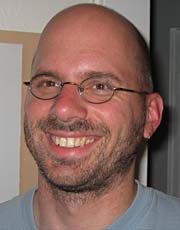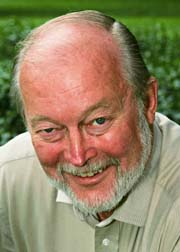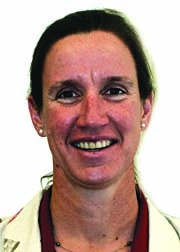Register
Click here to register on-line, and pay by credit card.
Click here to register by mail, and pay by check (deadline: received by Monday October 10).
Fall 2011 SoCal-Nev Section Meeting
Annenberg Science Complex
California State University, Los Angeles
Saturday, October 15, 2011
(Directions and Map)
Tentative Program
- 8:45-12:00 Registration
Courtyard, Annenberg Science Complex - 8:45-10:30 Refreshments
Courtyard, Annenberg Science Complex - 8:45-9:30 Graduate Students drop-off Job Application Materials for Feedback
Courtyard, Annenberg Science Complex - 9:00-2:30 MAA Book Sale
Courtyard of Annenberg Science Complex
Organized by Richard Katz and Michael Hoffman, CSU, Los Angeles - 9:30-10:30 Invited Address by Matthias Beck, San Francisco S.U.
Combinatorial Reciprocity Theorems
Annenberg Science Complex, Wing B, Lecture Hall - 10:30-10:50 Section Business Meeting
Annenberg Science Complex, Wing B, Lecture Hall
- 10:55-12:10 Contributed Paper Session
View the call for papers
Salazar Hall
Organized by Jen-Mei Chang, C.S.U. Long Beach - 12:15-1:25 Luncheon
Golden Eagle Ballroom, 3rd floor, Student Union Building - 1:30-2:30 Invited Address by Cindy Wyels, C.S.U. Channel Islands
Unexpected Outcomes in Undergraduate Research
Annenberg Science Complex, Wing B, Lecture Hall - 2:30-3:00 Refreshments
Courtyard of Annenberg Science Complex - 2:45-2:55 Graduate Students pick up reviewed job application materials.
Courtyard of Annenberg Science Complex - 3:00-4:00 Invited Address by Don Saari, U.C. Irvine
Mathematics and the Mystery of "Dark Matter"
Annenberg Science Complex, Wing B, Lecture Hall
Directions and Maps
For directions, use this interactive map. Here is a campus map of CSULA.
Parking: The easiest visitor parking is on the top of parking structure C (at north end of campus). It is a metered lot in which you pay at a kiosk and then put the permit on the dash board. Parking costs $6.00.
Hotels
In general, Pasadena and its hotels are pleasant and convenient if you have a car, while the Best Western in Monterey Park is closer to campus.
Pasadena For example, the Pasadena Marriott currently has a standard rate for the meeting date (Friday to Saturday) from 132.20 + tax. Cheaper rates might be available via the regular reservation number, 1-800-321-2211. An alternative, a little bit further east, close to the Santa Anita Mall, is the Residence Inn Pasadena Arcadia
Monterey Park The Best Western Monterey Park Inn on Atlantic Avenue in Monterey Park is relatively close to campus and is within walking distance of cafes and restaurants. Phone: (626)289-5090. Rates are about $75-$85, 10% less with AAA discount.
For other hotels close to Cal State LA, try http://www.smoothtrips.com. On the web page under “Or Near ...” choose “colleges,” then “California,” then scroll down to select California State University Los Angeles. You should get a long list of hotels near CSULA.
Some hotel chains have special rates for CSU (or state) employees. Be sure to check the individual websites of the chain hotels.
Register
Click here to register on-line, and pay by credit card.
Click here to register by mail, and pay by check (deadline: received by Monday October 10).
Registration Fees
| Registration | |
| Nonmember | $40 |
| MAA Member | $35 |
| Student | $15 |
| Registration and Luncheon | |
| Nonmember | $55 |
| MAA Member | $50 |
| Student | $25 |
On-site registration will be available for the meeting, but will be $5 more than the pre-registration charge.
Register on-line
Click here to register on-line, and pay by credit card.
Register by mail
Click here to register by mail, and pay by check (deadline: received by Monday October 10).
Matthias BeckSan Francisco State University |
After studies at the University of Würzburg, SUNY Oneonta, and Temple University, and postdoctoral positions at SUNY Binghamton, the Mathematical Sciences Research Institute, and the Max-Planck-Institute in Bonn, Matthias Beck arrived at San Francisco State University, where he is currently an Associate Professor in the Mathematics Department. His research is situated in the intersection of combinatorics, geometry, and number theory; he is particularly fond of counting integer points in polyhedra and the application of these enumeration functions to various combinatorial and number-theoretic topics and problems. He (co‑)authored two books and many research papers, more than a third of which feature student coauthors. He has mentored numerous graduate students at SF State and UC Berkeley, directs the NSF-sponsored (CM)^2 GK-12 program at SF State, and is one of the co-directors of the San Francisco Math Circle. |
Combinatorial Reciprocity Theorems
A common theme of enumerative combinatorics is formed by counting functions that are polynomials. For example, one proves in an introductory graph theory course that the number of proper k-colorings of a given graph G is a polynomial in k, the chromatic polynomial of G. Combinatorics is abundant with polynomials that count something when evaluated at positive integers, and many of these polynomials have a (completely different) interpretation when evaluated at negative integers: these instances go by the name of combinatorial reciprocity theorems. For example, when we evaluate the chromatic polynomial of G at –1, we obtain (up to a sign) the number of acyclic orientations of G, that is, those orientations of G that do not contain a coherently oriented cycle.
Combinatorial reciprocity theorems appear all over combinatorics. This talk will attempt to show the charm (and usefulness!) these theorems exhibit. Our goal is to weave a unifying thread through various combinatorial reciprocity theorems, by looking at them through the lens of geometry.
Don SaariUC Irvine |
After a Ph.D. in Mathematics at Purdue University and a postdoc in astronomy at Yale University, Don Saari spent the next several decades in the Northwestern University Mathematics Department. Then, coming from a Nordic Lutheran background, he discovered to his surprise that it is not a mortal sin to be comfortable by living in a warm area! So in 2000, he moved to U.C. Irvine where he is a distinguished professor in the Mathematics and Economics Departments, and the director of the Institute for Mathematical Behavioral Sciences. He is a member of the National Academy of Sciences and the American Academy of Arts and Sciences. |
Mathematics and the Mystery of "Dark Matter"
Even after spending billions of dollars on experiments, nobody has been able to find that elusive, mysterious thing hiding out there in the heavens that is called "dark matter." Sounds ominous; but, what is it? Why do we believe it is important? As described in this lecture, the mystery comes from a mathematical expression that can be taught in a freshman calculus class. As also described, mathematics is now shedding significant new light on this darkness to lighten up the mystery.
Cindy WyelsCSU Channel Islands
Teaching Award Recipient
 |
Cindy Wyels first learned to appreciate mathematics at Pomona College, earning a BA there in 1986. After receiving her Ph.D. from the University of California, Santa Barbara, in 1994, she took positions at the United States Military Academy and Weber State University, then spent several formative years at California Lutheran University. Growing interest in access to higher education led her to CSU Channel Islands, where she has directed the graduate program in mathematics since its inception. Over the years she has become more cognizant of the barriers facing low income, first generation, and historically underrepresented students, and has worked more actively to help students dream ambitiously and overcome obstacles. She is an advocate of undergraduate research and believes the experience can have a particularly strong impact on students from non-traditional backgrounds. Her research interests are in combinatorics, most recently in graph pebbling and graph labeling. |
Unexpected Outcomes in Undergraduate Research
Graph labeling constitutes an engaging area of research with myriad open problems, some of which are relatively accessible, yet still demanding and intriguing. As such, several types of graph labeling offer an excellent entry point into research. Student participation in undergraduate research can enhance a student’s education, or it can transform a life. Faculty mentoring of undergraduate research can supply intellectual excitement, fascinating challenges, and a means of giving back. This talk will contain arguments for immersion in undergraduate research – particularly with students from non-traditional backgrounds – as well as an overview of several absorbing student research projects in graph labeling, and stories about students and one faculty member whose lives are now far different than they would have imagined before their participation in undergraduate research.Contributed Paper Session
Faculty and students (undergraduate and graduate) are invited to submit short proposals for 15-minute talks in the Contributed Paper Session of the Fall Meeting.
All topics will be considered with an emphasis on combinatorics, graph theory, undergraduate research, and physics and astronomy in the undergraduate mathematics classroom to complement the invited presentations. The selection of talks will be based on interest to the expected audience and on scheduling constraints.
Submissions for all contributed papers should contain a title, an abstract (not to exceed one-half page in 12-point font and suitable for inclusion in the conference program), the desirable mathematical background of the audience, and any special presentation display needs other than an overhead projector.
Ideally abstracts should be submitted in LaTex format, with an accompanying PDF file. If you do not use LaTex, please submit a Text document together with a PDF file. Please email all submissions to Jen-Mei Chang.
The submission deadline is Friday, September 30, 2011.
CV, Research and Teaching Statement
Review for Graduate Students
Are you a graduate student or postdoc applying for faculty positions or other jobs this year?
Bring hard copies of your CV, Research Statement and/or Teaching Statement to the Fall Section meeting for review by a group of local mathematicians. They will help you look for ways to improve your application, so it is more competitive on the job market. To participate, please leave your materials at the registration table before 9:30 am, and they will be reviewed and ready for pick up around 3pm. You may bring academic and industrial CVs, which highlight different relevant achievements. The reviewers will return an evaluation rubric and feedback on the content and the presentation of your materials.
We wish you good luck in your job hunt!
